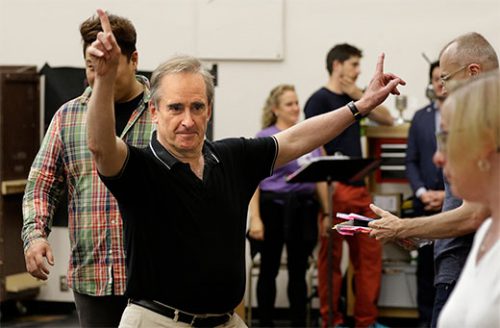With many months of travel and time in Europe behind me, I’m back in Los Angeles to conduct Macbeth for the opening of LA Opera’s 30th anniversary season. A new season isn’t necessarily a conventional time for “New Year’s” resolutions, but I have resolved to find a way to continue to blog. I am stationary now for the next month or so, and so plan to be communicative. Keep looking here on this site for updates, anecdotes, and observations.
On October 8 and 9 I will convene and give the Keynote Address for an unusual two-day symposium at the Colburn School in Los Angeles titled, “How Should We Perform the Troubled Past? A Weekend of Concerts and Conversation.” This will be presented under the auspices of the Ziering-Conlon Initiative for Recovered Voices at the Colburn School, of which I am Artistic Advisor.
In recent years, performances of Nazi-suppressed works have increased in number and frequency. At the same time, the academic community has also devoted greater attention to these composers and, among other issues, the historical, sociological and artistic effects of suppression, emigration, survival and revival. Too often, however, these two efforts—the artistic and the scholarly—conduct their activities separately, with few opportunities for artistic-scholarly exchange.
Our October symposium is one effort and one opportunity to increase the volume of shared space within the Venn diagram that describes these spheres of performance and scholarship. The discussion within and across varied disciplines is intended to be informative as well as to further encourage both research and debate.
The symposium is open to interested scholars, students, musicians and members of the public at no cost: only advance online registration is required here.
Professor Michael Beckerman of New York University, serves as Academic Advisor for this event, and I am grateful to him for his invaluable help. In our symposium overview he states:
“Scholars can sometimes offer performers the possibility of richly textured readings through historical contextualization, and can suggest new ways of approaching various works. Scholars, on the other hand, need performers to remind them that because of immediacy of a concert, players do not have the luxury of ambivalence, nor can they easily entertain multiple hypotheses; in order to perform one must choose. Since, we might argue, composers fall in between these two poles, it stands to reason that interpretations that combine insights from both performers and scholars have the potential to achieve a greater richness.”
Among the scholars, musicians and critics who will contribute to this discussion are: Michael Beckerman, Lily Hirsch, Tamara Levitz, James Loeffler, Carla Shapreau and Bret Werb; and artists Mirjam Frank, Clive Greensmith, Jeffrey Kahane, Renan Koen, Ignat Solzhenitsyn, Neal Stulberg and Simon Wynberg. Alex Ross of The New Yorker and Jeremy Eichler of the Boston Globe will also be making presentations.
There are many to thank for helping me realize this symposium, principally among them are Sel Kardan, President and CEO of the Colburn School, Robert Elias, Director of the Ziering-Conlon Initiative and, as always, to Marilyn Ziering for her unending generosity to and enthusiasm for our mission.
—James Conlon

